MPs’ debate on non-binary recognition was a mess of transphobia and fear-mongering
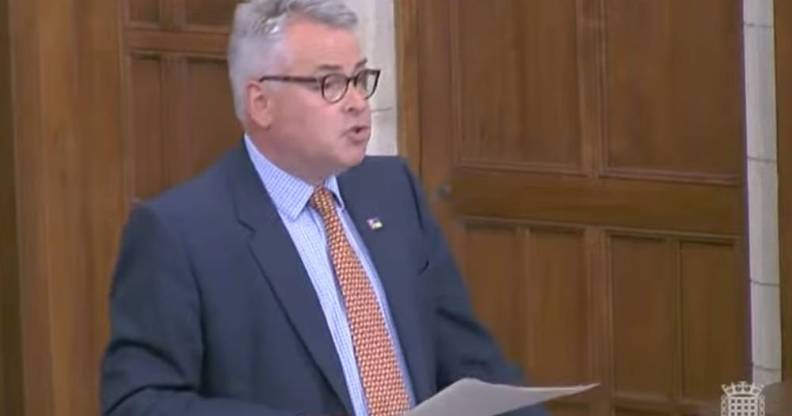
Tory MP Tim Loughton compared life-saving puberty blockers to cosmetic surgeries like a “breast-enlargement operation”. (Parliament TV)
Trans groups and LGBTQ+ advocates have roundly condemned MPs for airing a “tour de force of fear-mongering” and “transphobic tropes” during a parliamentary debate on non-binary legal recognition.
On Monday (23 May), MPs debated a public petition – which gained over 140,000 signatures – on making non-binary a legally-recognised gender identity in the UK. Currently, non-binary people have no path to legal recognition, meaning many are misgendered daily and live with inaccurate legal documentation.
The petition called for MPs to have a nuanced, respectful discussion on how legally recognising non-binary as a valid gender identity would “aid in the protection of non-binary individuals against transphobic hate crimes” and would “ease gender dysphoria experienced by non-binary people”.
However, this is not what transpired.
Tory MP Nick Fletcher opened the debate, telling parents to “push back” if their child identifies as non-binary or trans, and claiming that legally recognising non-binary identities would have a “hugely detrimental” effect on young people who he claimed are not “old enough or mature enough” to understand their own identity.
Tory MP Tim Loughton, Conservative MP for East Worthing and Shoreham, went further off-piste, suggesting that “no child under the age of 18” should be able to access puberty blockers.
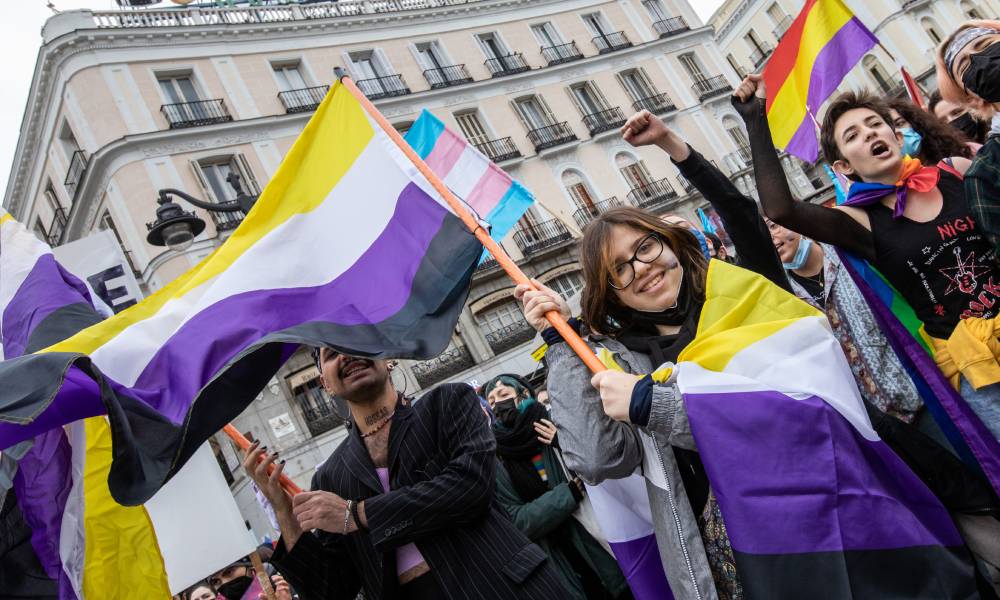
Advocates condemned MPs for including a “tour de force of fear-mongering, transphobic tropes” during the non-binary legal recognition parliament debate. (Getty/Aldara Zarraoa)
Loughton argued that puberty blockers have “life-changing impacts” before comparing them to cosmetic surgeries like a “breast-enlargement operation”, “a temporary suntan” and tattoos.
“Yet if someone challenges that — if someone questions whether those children are capable of thinking through the consequences and are cognizant of the implications for the rest of their lives of making that decision, with or without the involvement of parental responsibility — they are subject to cancel culture,” Loughton said.
A 2021 study of more than 9,000 trans and non-binary youth by the Trevor Project – an LGBTQ+ suicide prevention organisation – found that trans youth who take gender-affirming hormone therapy are nearly 40 per cent less likely to have been depressed or attempted suicide in the last year compared with trans youth who wanted such treatments but didn’t receive them.
Miriam Cates, Conservative MP for Penistone and Stocksbridge, said during the debate that there has been an “exponential rise in the number of trans and non-binary identified children in school”.
Cate claimed this rise was because of “ideology” and “in many cases… indoctrination”, perpetuating a harmful claim that LGBTQ+ people are ‘grooming’ children.
“These children then look up the terms ‘trans’ and ‘non-binary’ online and are drawn in by adults they do not know on Discord and TikTok, who tell them how to obtain and inject cross-sex hormones,” Cates said.
“They follow YouTube stars who glorify surgical transition.”
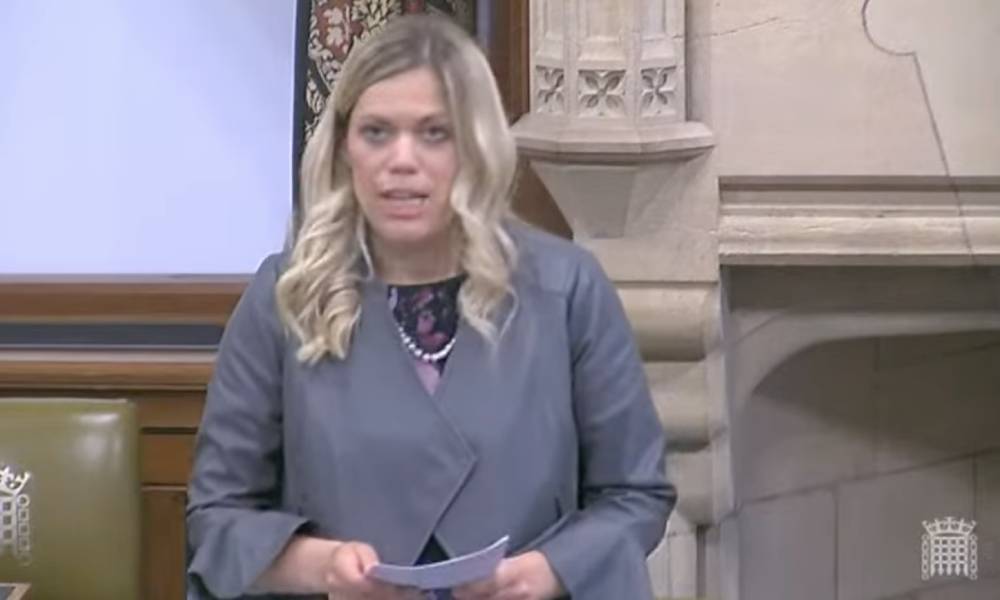
Miriam Cates, Conservative MP for Penistone and Stocksbridge, claimed during the debate that the rise in children identifying as non-binary and trans was because of “indoctrination”. (Parliament TV)
Trans and LGBTQ+ groups disgusted by MPs’ ‘fear-mongering’
Kai O’Doherty, head of policy and research to Mermaids, said the debate included a “tour de force of fear-mongering, transphobic tropes lobbied by some MPs” – most of which had “nothing to do with non-binary legal recognition”.
“It’s hurtful to hear people hijack a positive petition and use it to misrepresent and attack our community,” O’Doherty said. “A lack of legal recognition of non-binary genders impacts people every day, creating barriers to services, employment, travel and being able to live our lives authentically.”
O’Doherty added that the UK is lagging as other countries are “waking up to the injustice of this reality for non-binary people”, recognising the “need for what is a simple bureaucratic change”.
Sasha Misra, associate director of communications and campaigns for Stonewall, said the debate was a “rare opportunity” for lawmakers to “platform real concerns that non-binary people across the UK have”.
“It is disappointing that it was squandered due to MPs airing unrelated transphobic talking points, centring around trans women,” Misra said. “We urge MPs who wish to engage with the issue to take the time to speak with non-binary people and gain a deeper understanding of their lived realities.”
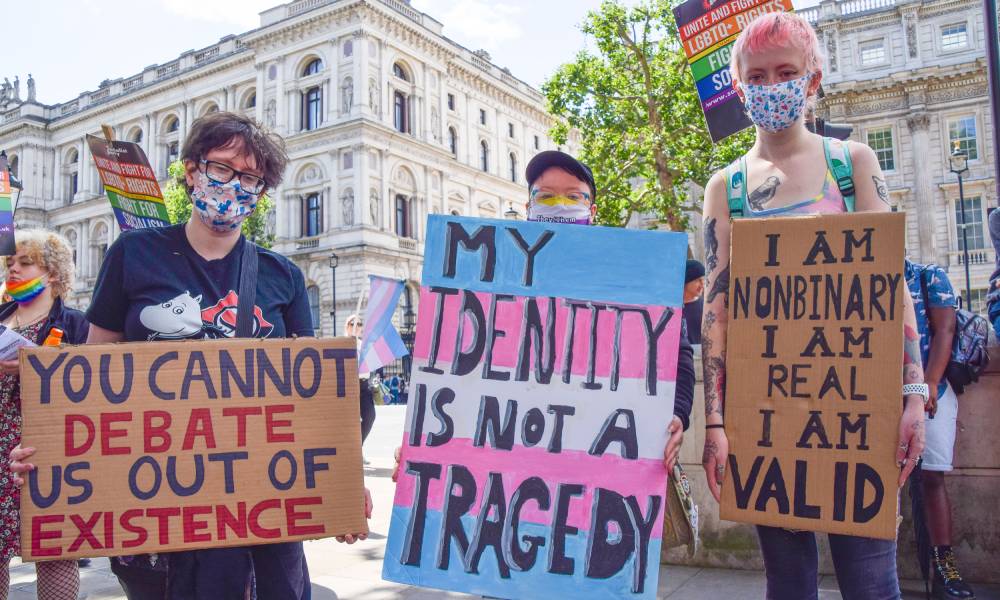
Protesters hold pro-trans rights placards during the trans rights demonstration outside Downing Street. (Vuk Valcic/SOPA Images/LightRocket via Getty)
Keyne Walker, a spokesperson on non-binary issues for trans-led advocacy group TransActual, said that the debate was “almost entirely disconnected from what non-binary legal recognition would mean in practice”.
“There was a great deal of scaremongering about children being ‘groomed’ to transition,” Walker said. “Not only are such fears entirely groundless, and not backed by evidence.”
Walker continued: “They are also deeply transphobic and homophobic, invoking fake narratives around predatory queer people.
“They also give the game away as to why this government is not supporting a conversion therapy ban.
“Because more than one speaker was out endorsing conversion therapy so long as a child does not end up trans.”
Walker explained that non-binary legal recognition is “primarily to do with issues around ID, voting access, privacy and discrimination” – not with the “overblown and irrelevant rhetoric” displayed during the debate.
Helen Belcher, chair of TransActual, added that Tory backbenchers showed an “alarming desire to ignore the subject under debate, preferring instead to claim that women should be fearful of trans women”.
“Front benchers understood that non-binary people are not a new phenomenon and deserved to be treated with respect,” Belcher said. “It is therefore disappointing in the extreme that government is still calling for evidence and data on non-binary people’s lives, and continuing to kick the can down the road”.
Elsewhere during the debate, Labour’s Anneliese Dodds urged the government to “focus on the treatment of non-binary people” and said there was a “need for research” on the lives and experiences of non-binary people in the UK.
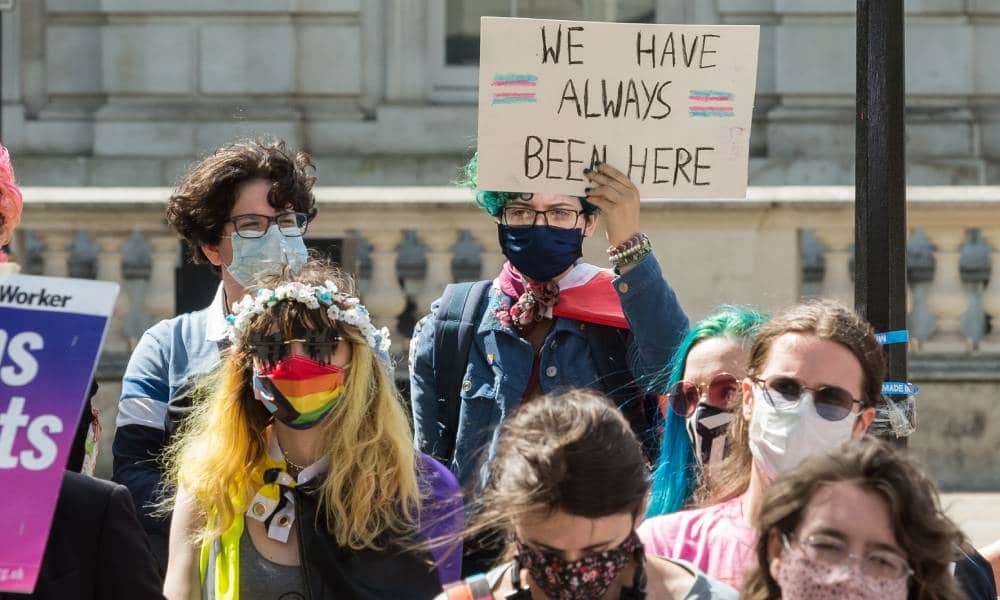
LGBTQ+ advocates have demanded reforms to trans healthcare, legal recognition for non-binary people and ban on pseudoscientific conversion therapies in the UK. (Wiktor Szymanowicz/Future Publishing via Getty)
Tory equalities minister Mike Freer echoed this sentiment that “more data and research” is needed. Freer said this is “exactly the government’s position” as “we must understand how everyday life for non-binary people is impacted by their identities” and “explore any obstacles they face that they may require addressing in law”.
“We need more data because it simply is not there in sufficient quality — as I have said, that information is lacking at present,” Freer said.
“Officials in the equality hub have conducted an analysis of existing data and research on non-binary identities, and have found that it is not of sufficient quality to allow us to draw conclusions, so the government will continue to monitor research into the experiences of non-binary people, seeking to better understand their lived experience.”

